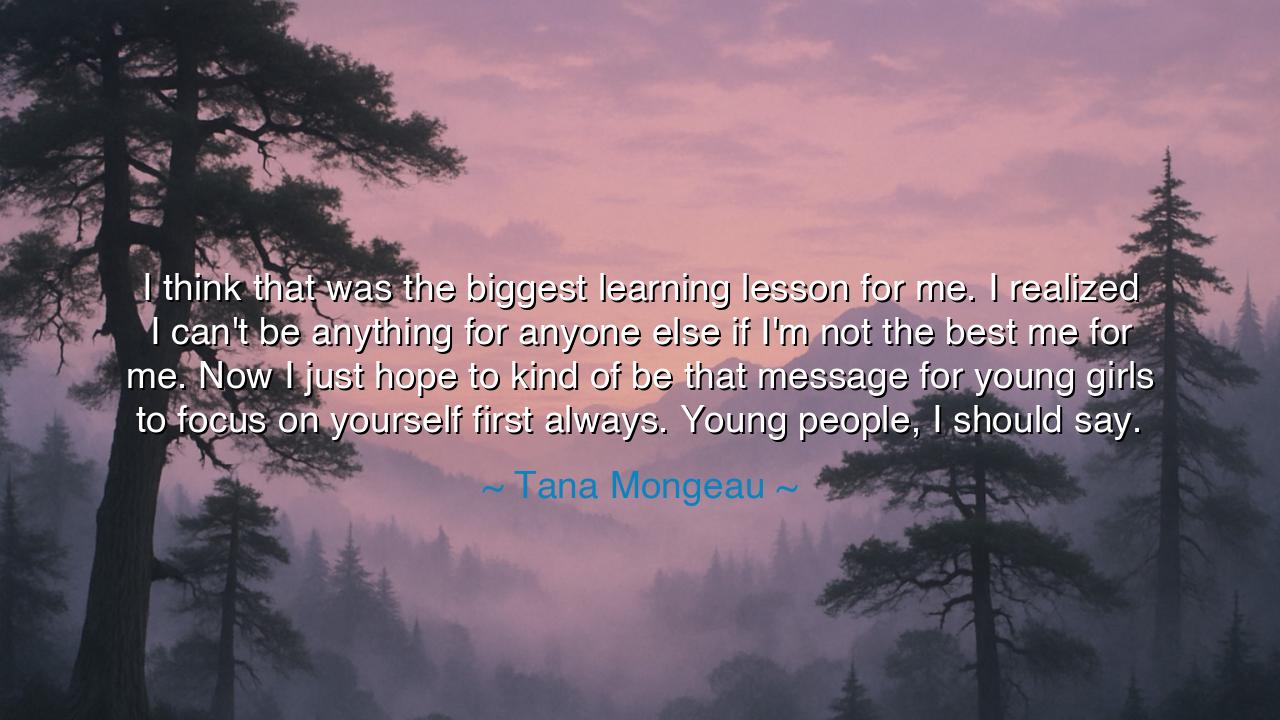
I think that was the biggest learning lesson for me. I realized I
I think that was the biggest learning lesson for me. I realized I can't be anything for anyone else if I'm not the best me for me. Now I just hope to kind of be that message for young girls to focus on yourself first always. Young people, I should say.






When Tana Mongeau said, “I realized I can't be anything for anyone else if I'm not the best me for me. Now I just hope to kind of be that message for young girls to focus on yourself first always. Young people, I should say,” she was not merely reflecting on her own journey — she was speaking a truth as old as the human heart. In her words lies the eternal struggle between self-sacrifice and self-realization, between the urge to give and the necessity to grow. Hers is the voice of one who has wandered through the noise of fame, the chaos of expectation, and discovered what the ancients called the “inner temple” — the sacred duty to know and nurture the self before attempting to guide another.
Her lesson was born not in theory, but in trial. Like many who rise too quickly into the public eye, Mongeau faced the weight of others’ expectations — to entertain, to inspire, to please, to perform. But as she herself admits, she found that trying to be everything for everyone led only to exhaustion and emptiness. Only by turning inward, by tending to the roots of her own being, did she begin to regain balance. In this, she echoes a timeless wisdom: that you cannot pour from an empty vessel, and that one who neglects the soul in service of the world will one day have nothing left to give.
The ancients understood this paradox well. Socrates taught, “Know thyself,” not as an act of selfishness, but as the first law of harmony. The Buddha withdrew into solitude beneath the Bodhi tree, not to abandon mankind, but to understand himself so that he might teach the way of compassion. Even Christ, before beginning his ministry, withdrew for forty days into the wilderness, facing his own inner trials before healing others. Each of these figures knew what Mongeau discovered in her own modern way — that self-knowledge and self-care are not vanity, but preparation. Only those who have made peace within can bring peace without.
The meaning of her words extends far beyond celebrity or youth. It speaks to anyone who has ever lost themselves in service, in love, in the pursuit of others’ approval. To “be the best me for me” is not a call to selfishness, but to wholeness. It is a declaration that true generosity flows from inner strength. When one is grounded in self-respect and self-understanding, kindness becomes effortless, and guidance becomes authentic. When one is not, every act of giving becomes tinged with depletion, and even the purest intentions falter beneath the weight of unhealed wounds.
Consider, for a moment, the story of Eleanor Roosevelt. For years she lived in the shadow of her husband’s political life, uncertain of her own worth. But when she began to embrace her own voice — her convictions about justice, dignity, and human rights — she transformed into one of the most powerful advocates of her age. Like Mongeau, she learned that strength radiates outward from a center of self-belief. Her service to others began only after she learned to honor her own truth.
Mongeau’s reflection is also a warning to the young, especially in an age where comparison is constant and identity is fractured by screens. She urges them to focus on yourself first always — not to retreat from the world, but to build a foundation that cannot be shaken by its noise. In a time when self-worth is often measured by followers, likes, and validation, her message is radical: turn inward, not outward. Build character before image. Seek balance before applause. The truest influence is born not from perfection, but from authenticity.
The lesson to be carried forward is simple yet profound: love yourself as a sacred responsibility. Treat your inner life as the soil from which all good things grow. Before you teach, learn. Before you heal, listen. Before you love another, stand in love with your own being. For the one who tends to their soul becomes a light to others without trying. The one who ignores it becomes a shadow, no matter how brightly they seem to shine.
Thus, Mongeau’s words join the chorus of timeless teachings that remind us: the path to serving the world begins with serving the self rightly. To be “the best me for me” is not to withdraw from humanity — it is to prepare oneself to meet it fully, honestly, and powerfully. When the self is whole, compassion is unforced. When the spirit is nourished, giving becomes joy. And in this balance lies the secret of both peace and purpose — a wisdom as ancient as the stars, and as urgent as the dawn.






AAdministratorAdministrator
Welcome, honored guests. Please leave a comment, we will respond soon